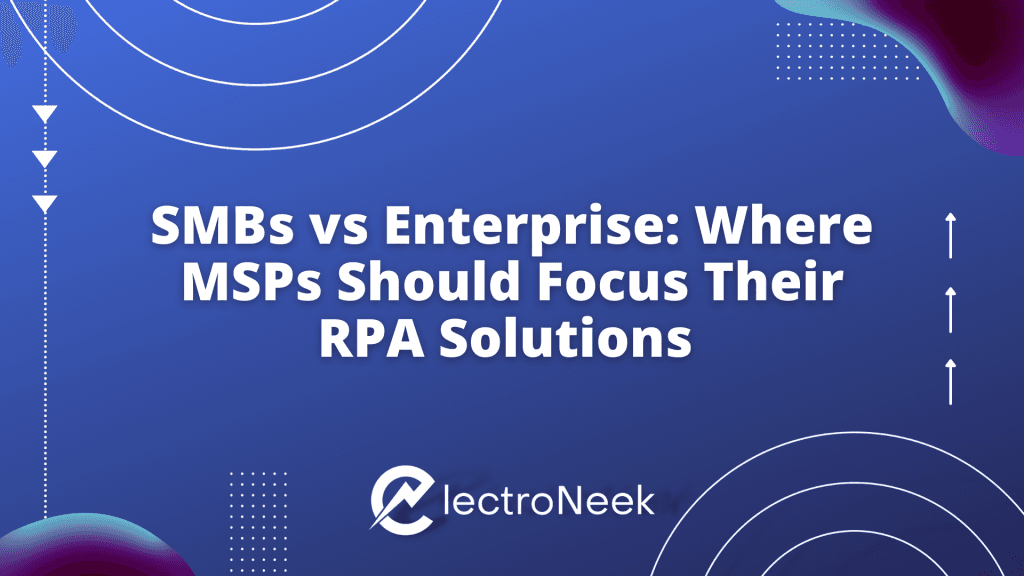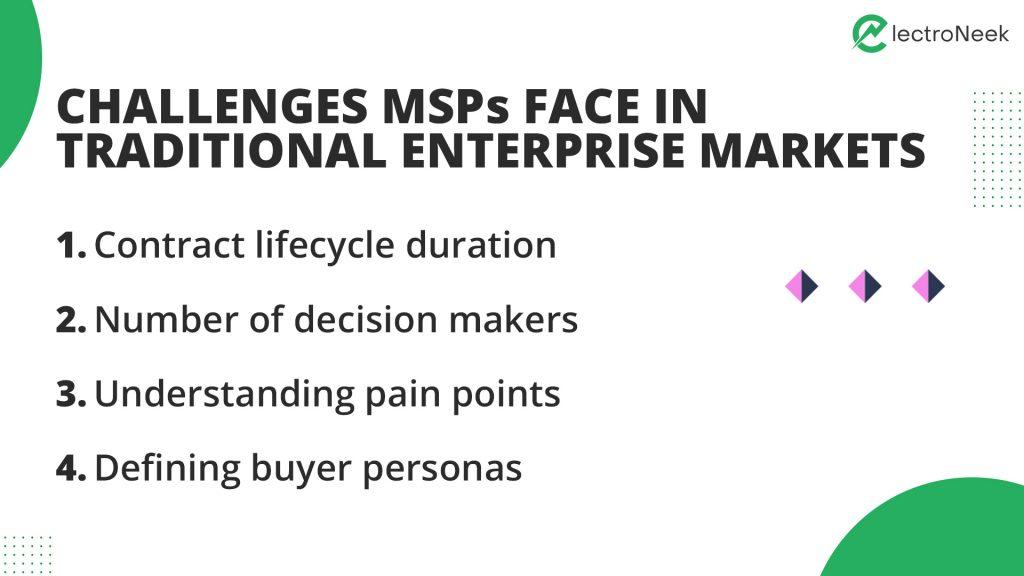
Managed service providers (MSPs) face a host of challenges to scale their business in 2021 and beyond. Between managing and monitoring their clients’ IT infrastructure remotely and navigating new landscapes of shifting end-user needs, MSPs must devise new strategies to achieve new growth (and avoid dips in revenue).
In the past, we have outlined how MSPs can leverage automation, specifically Robotic Process Automation (RPA) technology to overcome these challenges, specifically how to sell managed services to SMBs. However, simply adopting RPA as a solution for your clients is just the beginning. To capitalize on the opportunity that RPA affords, MSPs have an untapped market to work with: small and medium-sized businesses (SMBs).
This article will outline the advantages and rewards working with SMBs can achieve as compared to the traditional RPA market of enterprises. Additionally, we will highlight how partnering with the right vendor to scale your MSP business can help achieve these goals without breaking your bank.
Challenges MSPs face in traditional enterprise markets

When launching an RPA solution, one of the critical decisions an MSP has to make is whether to target traditional enterprise markets, or leverage relatively untapped SMB markets. An old-school view states that enterprises are more valuable clients than SMBs due to the contract size, and are ideal due to their enormous budgets and more identifiable prospects. This further translates into more significant annual contract values (ACVS), offering MSPs a higher return on investment (ROI) for their sales efforts. However, working with enterprises is not without any challenges for MSPs. Let's take a look:
Contract lifecycle duration
Enterprise contracts are typically more complex, with multiple moving pieces as the time spent on the overall sales process becomes longer and more unique as compared to an SMB sale. Deals may take months to close, and MSP sales reps need to make multiple sales calls between potential clients and internal stakeholders before the purchase is agreed upon.
For enterprises, MSPs typically develop customized strategies according to different buying criteria, and work closely with many executives within a company before the deal is signed off. This requires multiple calls, meetings, and product demos to achieve successful contract discussions. Overall, from the prospect stage to a closed sale, the enterprise sales cycle may take months to a year.
The number of decision-makers
The structure of an enterprise is often unique (and definitely vast), often requiring multiple decision-makers to agree upon any adopted solution, as compared to an SMB sale, where MSPs typically only communicate with one to three executives(sometimes only the business owner).
While it can be easy to nurture a relationship with an SMB buyer, it will take time with any enterprise buyers. Not to mention that MSPs might face additional challenges such as the sales process stalling if the enterprise stakeholders don't share the same vision of benefiting from your service; a situation that is firmly out of your MSP sales team’s control.
Understanding pain points
Typically, SMBs look to solve their immediate business needs, but this is not always the case with enterprises.
When making a sales plan, MSPs must do their homework to identify the client's pain points which mainly revolve around the business' future needs in the years to come. Given the indicators/metrics that sales reps need to track, MSPs need to spend more time and resources until enterprise clients are ready to engage.
Defining buyer personas
When targeting enterprise clients, MSP reps face immenser pressure. They need to comprehend the company's big picture and any future implications, while gaining an understanding of how their services differ from competing MSPs that are selling their services to the same enterprise client. .
Selling to enterprises requires an in-depth understanding of how the company buys, a process that may differ in varying degrees to your current MSP sales process. An MSP's knowledge of the enterprise and the strategic goals directly impacts its ability to sell to them.
Reasons why MSPs should consider SMBs for RPA business

Targeting SMBs with RPA solutions offers an MSPs’ sales team new opportunities in a market that remains largely untapped. Opportunities include:
Lower customer acquisition cost
To sell managed services for SMB, MSPs can control costs throughout the entire sales cycle by automating lead capturing and nurturing activities. Sales reps can focus more on discovering prospects, rather than developing prospects at an enterprise level (i.e., finding an ideal account and spending time on grooming the lead to purchase).
This simpler focus and approach allows an MSP to tailor their solution towards the individual SMB, while keeping acquisition costs low and reasonable.
Shorter sales cycle
Unlike enterprises, SMB sales cycles typically require less red tape and fewer stakeholders. Often the budgetary decision-maker is the business owner who wants to find a quick solution that solves immediate problems at a reasonable cost.
Though SMB owners may have difficulty defining what exactly they need, MSPs can easily engage with them to find the best solution. This process traditionally follows a sales funnel of a SMB client visiting an MSPs’ website looking for information, which becomes a qualified lead by the BDR (business development representative), and further nurtured through follow-up emails and calls. When this process is successful, the SMB lead requests a demo or contacts your sales team for a meeting. At this point, the account executive will manage the lead, close the deal, and hand over the relationship to the customer success team.
The simpler and much more defined sales process of acquiring a new SMB client allows for much shorter sales cycles than the expansive enterprise client.
An untapped, profitable SMB market
There were approximately 31.7 million SMBs in the US in 2020, and worldwide SMB spending is expected to reach $684 billion in 2021, according to the latest report from the International Data Corporation. While SMBs may not have the biggest budgets, they are investing more in technology — such as RPA — than ever.
Instead of ignoring SMB sales, MSPs should find a cost-effective method to tap into this under-served market, as the potential cumulative profits from this sector are enormous.
How ElectroNeek can help you grow your RPA business
Offering a satisfying customer experience while achieving maximum efficiency and productivity is critical for every MSP's monthly recurring revenue (MRR). There are a variety of IT providers for small businesses who offer different degrees of automation solutions, creating a significant challenge in selecting the right vendor that offers an RPA platform that best suits your MSP business model.
To start, MSPs benefit from partnering with a single trusted RPA vendor rather than investing in multiple solutions that were not designed to work with one another. By choosing one platform, you only have to manage one relationship with a vendor, and you avoid facing deployment limitations by leveraging software that was designed to integrate cohesively with many different environments.
Additional benefits of choosing a single, trusted RPA vendor include:
A steady ROI pipeline
MSPs can leverage ElectroNeek’s RPA ecosystem to extend beyond their traditional capabilities, with features such as remote monitoring and management and professional services automation, to grow sales margins. By leveraging RPA tools, MSPs can overcome challenges in existing applications and implement automation for internal functions to improve their customer support and help desk functions.
MSPs will find lower costs with ElectroNeek by saving on bots licenses and development tools. ElectroNeek Studio Pro users do not invest in bot licenses. Instead, ElectroNeek’s MSP partners can deploy as many bots as required for multiple clients, allowing them to maximize profits as compared to investing in other automation software that requires investment in individual bots.
Value
ElectroNeek is a no-code/low-code RPA platform designed to eliminate repetitive and labor-intensive tasks across various systems and applications. ElectroNeek's automation tools are extensible and flexible, allowing MSPs to sell more in less time.
Our MSP partners can deploy bots across several clients' systems regardless of any fluctuations in the volume. In contrast, pure-play RPA software requires investment for every bot, forcing you to size your bot deployment. As an ElectroNeek partner, you can scale your RPA business quickly and profitably without those additional costs.
Easy implementation and integration
ElectroNeek RPA tools integrate with popular applications and systems that MSPs have already adopted from the start. MSPs benefit from ElectroNeek’s flexibile solution that accommodates RPA projects from piloting to scaling. This easy-to-use and intuitive platform allows MSP partners to leverage RPA tools to replicate a variety of business functions.
This implementation model contrasts to the traditional cost of implementing RPA from more traditional vendors, which is often higher than the cost of the technology itself.
Leverage RPA technology to grow your SMB client base
The SMB market offers MSPs with RPA solutions an untapped potential. As compared to traditional enterprise clients, SMBs offer lower acquisition costs, fewer risks, and significantly less resource consumption. To take advantage of this opportunity, MSPs must partner with a RPA vendor that offers RPA solutions that best integrate with your current solutions and sales processes.
ElectroNeek’s RPA ecosystem allows MSPs to deploy RPA solutions to their client base in a way that best suits their individual needs (based on their clients’ size, tech priorities, industry, investment level, and automation requirements). By leveraging the RPA capabilities of the ElectroNeek platform (and free bot licenses), MSPs can not only improve their solutions offered to existing clients, but find new opportunities to sell managed IT services for small businesses..
To learn more about how ElectroNeek can support your RPA-as-a-Service business, book a demo with our support team.
